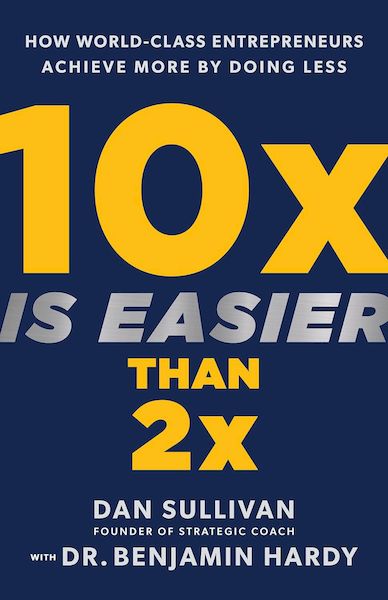Building upon one of his high-level foundational teachings: Strategic Coach co-founder Dan Sullivan explains why achieving 10 times growth is simpler than aiming for twice growth.
Dan Sullivan, the world’s primary coach for highly successful entrepreneurs, wants you to understand that achieving 10 times growth is significantly simpler than striving for twice growth. Most find this notion perplexing at first because just picturing 10 times growth makes them believe they need to do 10 times more work to attain it. However, being a 10 times entrepreneur is nothing like what most people assume.
10 times is not the end result; it’s a counterintuitive process you can implement every time you desire exponential growth in your life and business. To make 10 times feasible, you must concentrate on broadening what Dan defines as your four most crucial freedoms-time, money, relationship, and purpose. As your time becomes 10 times more valuable, you progressively multiply the money you earn both in terms of amount and profitable satisfaction. As money turns into a tool you can increasingly access with greater ease, you will engage with a growing number of other freedom-motivated individuals. As both your professional and personal life fills up with 10 times more unique and collaborative relationships, you will realize that your most powerful purposes in all areas become 10 times more lasting and positive for everyone involved. You will be impressed by what your life has evolved into, and the meaning and impact you’re having.
10 times is fundamentally about quality versus quantity, and the quality of your freedoms determines the results you achieve.

- The startling simplicity of 10x growth
- 10 times the quality of everything you do
- 10 times embraces abundance and rejects scarcity
- Reveal your 10 times past to clarify your 10 times future
- Embrace 150+ leisure days per year
- Establish a self-operating corporation
- Recap: 10X isn’t solely about you
The startling simplicity of 10x growth
The primary insight of this chapter is that while 2X appears easier than 10 times growth, the reverse is actually true.
With gradual growth, everything seems essential, and it’s challenging to pinpoint things to cease doing. However, 10 times goals — unattainable goals — push you beyond your existing level of knowledge and assumptions compelling you to step back.
In doing so, you discover that while there are numerous paths to reach incremental results, there are actually very few paths to reach 10 times results. Therefore, gaining this clarity regarding the activities and people in your life that are generating most of your results is crucial.
The consequence of this is that 10 times growth necessitates eliminating the 80% of current clients, roles, behaviors, and mindsets that are hindering you. This is what makes it so transformative, and why 10 times can be simpler and more direct and demand less effort than twice.
The challenge is to have the bravery to relinquish the 80% of things that appear so important. It doesn’t mean that you discard them entirely from your business, but it does mean that other people need to take them on.
Recap: With twice, everything seems crucial. With 10 times, only a few things are crucial, and that makes 10 times easier to pursue.
10 times the quality of everything you do
The central insight in chapter two is that 10 times is mainly a qualitative aim about quality and innovation. It’s not actually a quantitative aim.
Focusing on mastery – doing a few things extraordinarily well – will be far more effective than doing many things at a commonplace level.
Jimmy Donaldson, also known as Mr. Beast, illustrates this thinking well. He elaborates that by creating YouTube videos that are just 10% better than everybody else, you may receive four times the number of views. In other words, an enhancement in quality produces exponential results.
The assertion here is that 10 times goals are simpler than twice goals because they are less competitive and require you to delve deep on a few things rather than broad on many things.
Expressed differently, 10 times doesn’t require you to be 10 times better than everyone else, but it does oblige you to the path of mastery. It’s hence more about identity than an aggressive action plan.
Recap: To achieve 10 times, do significantly fewer things, better.
10 times embraces abundance and rejects scarcity
This chapter proposes that we don’t require 10 times, but if we get clear on our purpose, then we might desire it enough to opt to pursue mastery in our unique ability (what we most have to offer).
This chapter commences with an intriguing discourse around “needing versus wanting.”
Needing is a scarcity mindset predicated on our belief that we must justify to other people why we desire what we want. We presume that if we want something, then somebody else will not have it. Instead, if we take a wanting approach to life, we can establish ourselves 10 times goals.
The truth is we never need 10 times goals, but we might indeed them, and we need to step into that ownership.
The chapter then proceeds to explore the notion of mastery, linking it to the concept of a Unique Ability. This is the manner in which we provide the most value for other people, and that nobody else could ever duplicate even if they desired to.
Our unique ability likely manifests in numerous areas throughout our entire life. So, it’s crucial not to restrict it to a very specific modality such as teaching, writing, consulting, leading.
When you exhibit that confidence in your mastery, then you are liberated from having to continuously be a “seller” of yourself. Instead, you can embrace a “buyer” mindset and only pursue opportunities and collaborations that align with your 10 times goals.
Once you break free from a scarcity mindset, you can set explicit standards and boundaries. For instance, what is the minimal value you are willing to accept for your services? What types of opportunities will you welcome, and what will you decline?
Recap: If you only pursue what you require, 10 times isn’t for you. But if you decide you want it, commit to mastery in your Unique Ability.
Reveal your 10 times past to clarify your 10 times future
The objective of this chapter is to remind you that you’ve already made 10 times leaps in the past, and can do so again.
Many high achievers are inclined to be consistently frustrated and unsuccessful, irrespective of how much they’ve accomplished. This is because they measure themselves against all the goals they’ve set. However, these goals or ideals, and regardless of how far we progress towards them, the further they retreat because we simply elevate what we are working towards.
Instead, measure your advancement against where you have been previously. Don’t compare yourself with other people or any ideals. But assess how you have advanced. This generates a game you can triumph in. Any situation can be utilized for your learning.
This underscores the significance of scrutinizing progress against various timeframes. The progress in the last day, the last week, the last year, and so forth.
This chapter goes a step further and essentially urges you to list out your prior 10 times leaps. Again, it’s essential to recollect that 10 times isSubjective, not objective – so significant improvements for Benjamin Hardy encompass being admitted for a PhD, getting married and starting a family, becoming a paid author, etc.
Within this section, Benjamin Hardy and Dan Sullivan also introduce the concept of a “fitness function” and inquire:
What are you enhancing for?
What are the attributes you wish to cultivate?
What are the criteria by which you gauge progress and achievement?
To recap: The more you concentrate on something, the more you embody it. To achieve a 10X enhancement, consider what kind of persona you should embody to deliver the corresponding value.
Embrace 150+ leisure days per year
The core concept of this chapter is that the periods when you completely detach from contemplating your enterprise will paradoxically propel you towards your 10X targets more swiftly than ever.
This chapter outlines Dan Sullivan’s widely-recognized time-blocking system:
Focus days for engaging in your paramount high-value undertakings, the “20%” that will propel you towards your 10X goal.
Buffer days for groundwork (managing other essential responsibilities not within your Unique Ability)
And Free days when you genuinely abstain from business focus, enabling you to rejuvenate, explore fresh concepts, unwind, and connect
The unexpected truth is that the more free days you take, the more probable your success. Innovation and expertise necessitate you to be well-rested, imaginative, and delving into concepts beyond your field. Surrendering the low-value 80% activities requires you to give your team the “present of independence”, empowering them to handle the work autonomously.
Recap: If you are constantly toiling, you won’t have the room and vitality to truly break through to 10X.
Establish a self-operating corporation
The central idea of this chapter is that, fundamentally, you desire to foster an environment where every team member is empowered to pursue their Unique Ability and escalate their value tenfold.
This chapter revolves around illustrating the transitions between four tiers of entrepreneurship that each entrepreneur will need to navigate on their voyage towards 10X objectives:
Level 1: Independent performer, managing all tasks yourself.
Level 2: Manager who has assembled a team around them.
Level 3: Leader who has entirely disengaged from operations, with leaders in position to oversee everything, enabling you to focus on innovation in your Unique Ability and elevate your value tenfold.
Level 4: Leader who has established a business where everyone, at every level, is empowered to continuously refine their scope to concentrate on their Unique Ability. Consequently, the full team is engaged in magnifying their value tenfold.
Recap: 10X isn’t solely about you
It concerns every individual in your team mastering the art of enhancing their own value.
Crucial insights and practical guidance from “10X is Easier Than 2X”
The book contains a wealth of knowledge, and Dan Sullivan and Benjamin Hardy present a comprehensive list of key insights at the conclusion of each chapter – almost an excess, in my perspective! Here, in my view, are the essential action steps from the book:
Duly remember that 10X is subjective, and implies “operating at an entirely new level” in some manner. This is why I prefer discussing “incremental versus exponential” or “breakthrough goals” to encapsulate the same concept.
Devote some time to delineate what a captivating 10X objective would resemble, without the need to rationalize why you require it. You can merely desire it.
Ensure it not only pertains to your present work scenario but also aligns with your enduring realm of intrigue, inspiration, and value-generation over time.
You are the impediment, hence seek out individuals to handle every task unrelated to your Unique Ability. These are the responsibilities keeping you ensnared in the cycle.
Specify what you are enhancing for and envision what pursuing mastery will entail. How will you leverage your Unique Ability to innovate and enhance quality?
When feeling disheartened, promptly assess if you are comparing yourself against your 10X ambitions, and instead recollect – and celebrate – the strides you have already taken.
Allocating ample time away from work, and refraining from infusing work into free days is crucial. Just as every athlete comprehends, recovery is an indispensable component of top performance. Arrange your free days far in advance, securing them, allowing you to plan around them effectively.
Engage in conversations with your team regarding their Unique Ability, and grant them the liberty to explore ways to dedicate more time to that area.


